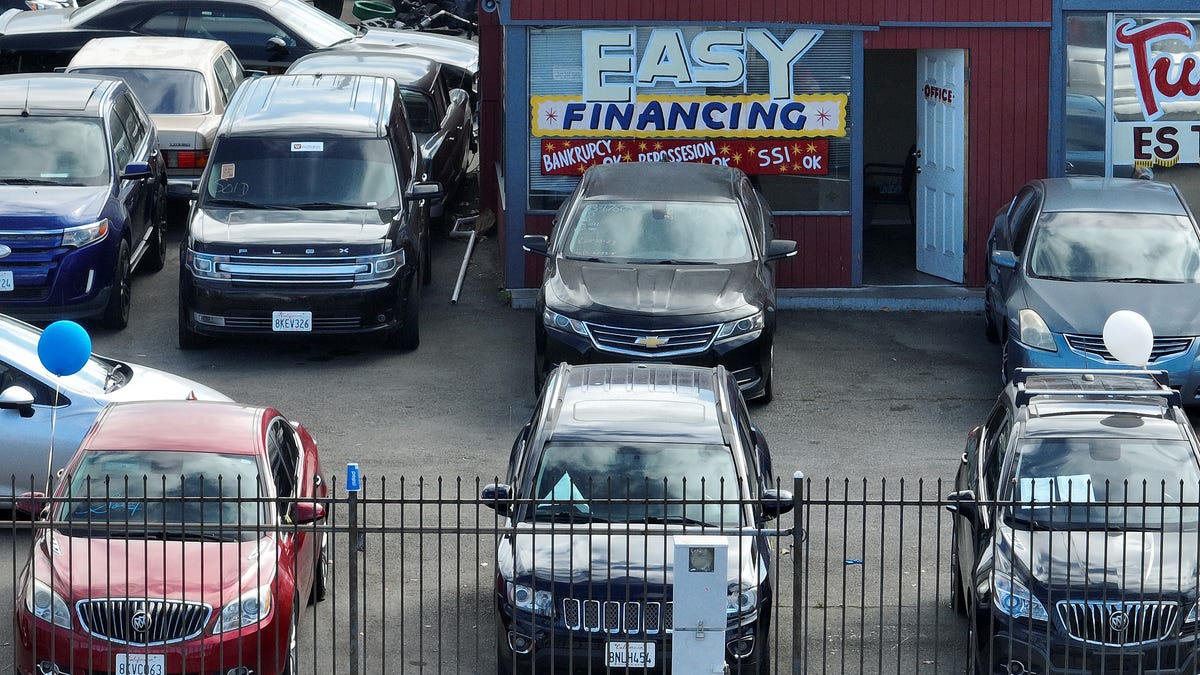- cross-posted to:
- aboringdystopia@lemmy.world
- cross-posted to:
- aboringdystopia@lemmy.world
When cars that should cost $20-30,000 now cost $40-60,000, that’ll happen.
That’ll happen as long as people keep buying them.
It’s less the demand and more the greed of car companies and the shittiness of the products.
Companies are, and always have been greedy, that’s the point of their existence. They didn’t decide one day to become greedy. They will always maximize profits, always. You should more blame inflation than anything, it’s by far more damaging to your spending power and savings than anything else.
That’ll happen when the Federal Reserve prints more money and devalues the currency every year.
More of their cars are underwater than ever before, too.
Speaking of that, be prepared for a whole lot of cheap used cars to hit the market in six to twelve months. These will be flood cars, and Carfax may not tell you that. It can definitely be worth it to pay for a title search service that allows you to plug in a VIN and then returns everything that’s ever been attached to that vehicle’s title.
You do not want to buy a flood car.
Be wary of titles with salvage too from certain time periods. Salvage cars can work out depending on its situation. I had one that lasted years written off by the previous owner’s insurance because of a bent frame that wasn’t a big deal. Flood is no-go though, way too many things in modern cars that water immersion will damage in short and long term, and hard to detect until it fails.
I would avoid salvage titles in almost every situation. You don’t know why it was a write-off, you don’t know who rebuilt it, and you don’t know what kind of job they did.
If you’re already into turning wrenches, and it’s a “special” car, maybe. If you are buying it from the person or company that did the reconditioning, maybe. But most of the time, the write-offs go to auction, somebody buys them, rebuilds them, sends them right back to auction. Then your local fly-by-night used car lot buys them and sells to unknowing retail customers.
It is a big “caveat emptor” flag for sure. I had a bit more info on the car in question than a blind auction, and I’m experienced enough to work on my own stuff. Good additional point, it’s not for everyone.
Can confirm. Went to look at a car and it had mud in the undercarriage.
Checked the Carfax in the car and it didn’t mention flood damage.
Bought my own Carfax and found out it had been in a flood.
Lesson: Always buy your own Carfax
I’ve heard pulling the seat belt all the way out is also a tell for flood/hurricane cars, mold/mildew
*Sad Floridian noises
Are you telling me that people show up to dealerships and pay to trade in a car? The repo man will come to your house and pick that pile up for free.
I thought the car lease was the worst deal on the lot.
Yeah it’s crazy. Traditionally leases are a bad financial decision. I’m currently in the market for a midsize-large SUV and prices are crazy so I’m not targeting the vehicles I actually want. I’m afraid to buy car now and end up underwater on a loan if and when prices settle down and I’m in a position to upgrade to something bigger/newer, so I’m considering a lease so at least by the end of the term I don’t owe money to the bank.
Now think about the housing market. Rental nation. Just throwing away money. No generational wealth for our kids. Keep pumping out slaves to capitalism.
Car dealer has been begging me for my Tacoma since I bought it just pre-pandemic and with how low mileage it is.
I enjoy the calls, lol.
I bought my car at the end of 2018, and I get flyers in the mail maybe twice a month from the dealership trying to get me to “upgrade.” Since I work from home I barely put miles on it.
I’m fortunate in that I have paid it off, and the flyer is like, “We see you have paid off your car loan, we can get you into a new car for $300/m!” Yeah no. That’s not the deal they think it is.
I might have to spend a good deal on maintenance over time, but I have always bought used, fully, in cash.
Having a car note in the hundreds of dollars each month just sounds bonkers to me.
I also chose to live in a city with amazing public transit so if my car breaks down I have options.
That’s fine if that’s what you want to do, but when car loans are less than 2% and bank interest rates can be 3-4%, you can literally make money by taking out a loan.
On top of that, if you are in an industry that gives regular raises, having a 5 year loan means you’re paying less of your paycheck every year towards the car.
Obviously most people aren’t thinking this far ahead, but even if you have the cash, sometimes it actually makes sense to take out a loan.
Obviously most people aren’t thinking this far ahead, but even if you have the cash, sometimes it actually makes sense to take out a loan.
Here’s where the “makes sense” becomes subjective. If your definition is absolute most cash value extracted, then yes.
However there’s a certain mental cost that you don’t escape by having to make sure you don’t get screwed on the initial loan terms, have the cash for the pay the installments, make sure the payments get to the lender, follow up on any customer services issues that occur over the life of the loan, navigate any life events which can restrict or restrain your cash flow being able to make payments (like layoff or illness), possibly liquidate holdings to free up cash to make the payment, keep track of the cash you would have spent on the car in an external account earning the best return you can get (with varying interest rates or market conditions).
…or you can pay for the car outright one time, and never think about those things again for that car possible for a decade or more. Today’s life is filled with many such mental burdens. The value in being able to simply never have this worry is very underrated in my opinion. This is one component to approach a care-free lifestyle while still maintaining your responsibilities and freedoms.
You are 100% correct, EXCEPT for the emergency cash flow thing is backwards.
Let’s say you have $20,000 for a car. If you put that whole $20,000 to buy a car, and an emergency comes up where you need $5,000, it will be much harder to get a loan to pay for that on the same terms as a car loan.
On the other hand, if you put $2,000 towards the car and borrow $18,000 at 3% for 5 years, that’s $325 a month, give or take depends on fees. Now you still have $18,000 free for emergencies, and you’re theoretically still making money at your job, so you can keep building that neat egg with interest. If that same $5,000 emergency comes up, you still have $13,000, which is more than 3 years of payments to cover the rest of that $5,000.
Obviously emotions come into it. Obviously some folks can’t just leave that $18,000 in the bank. But there are real tangible benefits to just taking out a loan.
You are 100% correct, EXCEPT for the emergency cash flow thing is backwards. Let’s say you have $20,000 for a car. If you put that whole $20,000 to buy a car, and an emergency comes up where you need $5,000, it will be much harder to get a loan to pay for that on the same terms as a car loan.
What you’re describing there to me is an anti-pattern. If you have to spend $20k to buy a car and you blow through your entire emergency fund to do it bringing your emergency fund to $0, you’ve already made a mistake. To use your numbers, if you have $20k and you need a car. You buy a $15k car. You have a fully paid off car, and an extra $5k in the bank for emergencies. Further, I still make a car payment, but to myself, every month that goes into savings to buy the next car outright. Its easy to do because I don’t have a real car payment to a bank. If money is ever tight, I can choose to not make my “car payment” to myself giving me more flexibility, liquidity, and less overall worry. A year after this purchase and even after the $5k emergency, I have $3900 positive in savings from my “car payment to myself” and still have a paid off car.
On the other hand, if you put $2,000 towards the car and borrow $18,000 at 3% for 5 years, that’s $325 a month, give or take depends on fees. Now you still have $18,000 free for emergencies, and you’re theoretically still making money at your job, so you can keep building that neat egg with interest.
Continue to play that out with a more likely bad case scenario. You start with $18k in the bank, and you’ve now leveraged your emergency fund to also cover car. You have your theoretical $5k emergency dip into it leaving you with $13k in the bank. A year later, you lose your job. Your car payment is still due, you have the remainder of the real car payments to make at $325/month to the bank. So now you’re drawing down your savings (and the money you would have paid off the car with) just to live on. You can try to sell the car, but its depreciated and you’re not going to get even enough money to pay off the bank note. You took on the worry of this and this risk everyday for five years to try to make about a measly ~$1k profit.
I’m not saying this is exactly how its going to happen, but in your scenario the possibility exists for this. In my “buy the car outright” it doesn’t. How often in life does everything go perfectly for you? My experience says, not often.
deleted by creator
Newer cars actually run longer on average because of maturity of manufacturing processes and other things.
“Old Clunkers” like those Corollas from 97 or some shit are just what survived, the “Old Cars Only” people conveniently forget about the millions of 97 Corollas that died way too early
It’s not impossible to buy a car newer than '97 with cash.
It was just an example and “with cash” is open ended, how much cash? 500? 5000? 10,000?
Debt also isn’t inherently bad, lots of people might have 10k in savings that they might be able to drop a huge chunk of to get a car…but then their savings will be depleted by that much when they could have made a sensible purchase on a low interest loan with reasonable terms.
Did you grow up on Dave Ramsey? Much of his “anti-debt no matter what” rhetoric is bumpkis
Mathamatically anti debt is garbage adkice. But people who live anti debt tend to get a nice nest egg (several million) and retire early while those who use debt like beyond their means. Debt used well can be good but I don’t consider a car debt use well.
Ngl, submersible private automobiles sound badass enough to actually convince me to get my license.
Car dependency is a gift to the auto/oil cartels but a curse on the planet and its inhabitants.
More than 24% of all trade-ins toward new vehicle purchases had negative equity, and 22% of those with negative equity owed more than $10,000. Two other contributing factors to the rise in this type of loan: many consumers are taking out longer-term loans for cars to reduce monthly payments and people are increasingly trading in their cars before it’s financially smart to do so.
When you buy a junk brand it loses value very quickly. Too many people are buying things to look a certain part in society. They really can’t afford it.
the country was designed to require cars.
then car manufacturers quit making affordable vehicles to cater to the rich. Meanwhile the government forbid cheap foreign EVs to protect US car makers behavior.
Quit blaming people for needing what the culture requires.
Doesn’t matter the brand, cars traditionally don’t appreciate in value. Wisdom always was that it starts to lose value as soon as you drive it off the lot, because of the wear it takes through regular use. Then the pandemic hit, and a shortage of new cars, which drove up the used car (AND new car) market. It’s all madness IMO, but people with the power to do so (corpos and private individuals alike) are trying to hang on to that bubble for dear life.











